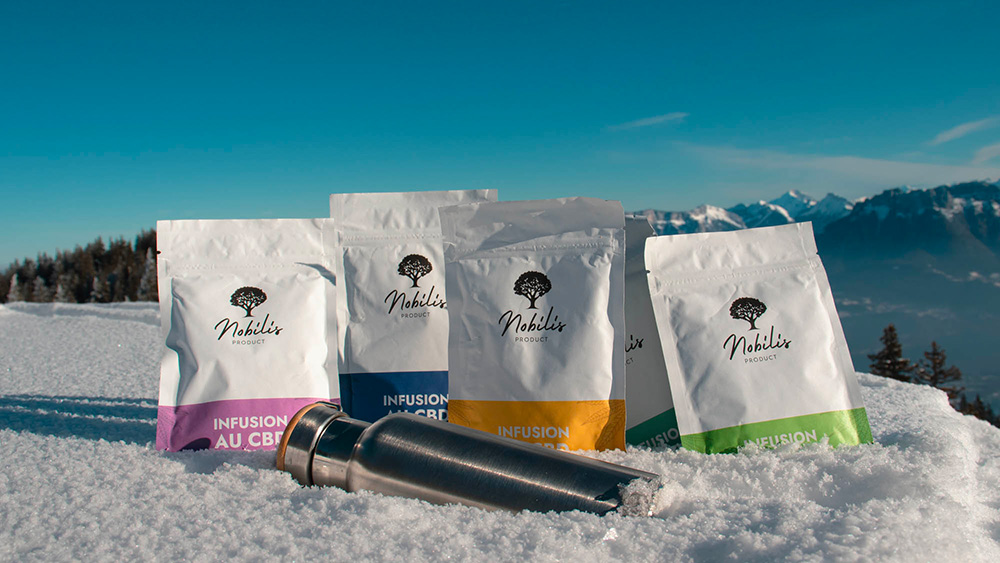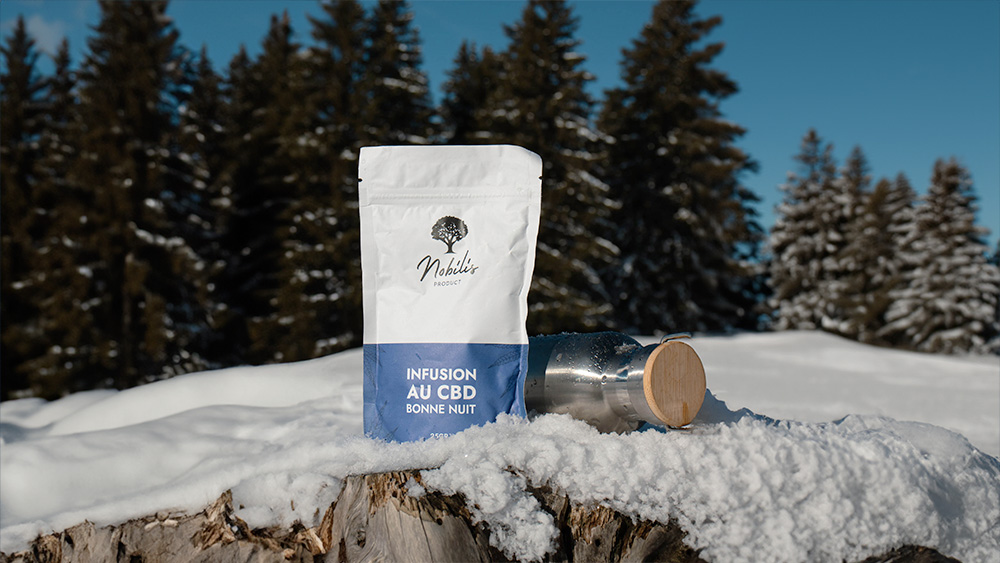
Our tips for preparing a CBD infusion
December 27, 2023
What are the effects and benefits of a CBD infusion?
December 27, 2023Among the many benefits attributed to CBD infusion is that of promoting sleep. This seems logical, since it's well known that a hot drink before bed promotes better digestion and relaxation. Cannabidiol (CBD) is also known for its anti-stress properties.
But beyond that, how can hemp tea promote sleep? Is it more effective than vervain? Are there any side effects or precautions to be taken?
In this article, we explain why CBD infusion can effectively fight insomnia (studies to back it up) and, above all, how to consume it to reap all its benefits.
How can hemp tea improve sleep quality?
There are so many natural remedies out there that are supposed to be able to replace a traditional sleeping pill, that you may be skeptical. And we understand! How does CBD work in the body to promote sleep? Here's what the science says.
The endocannabinoid system 🧬
To understand the action of a CBD infusion on sleep, you first need to understand the endocannabinoid system.
In a nutshell, the endocannabinoid system (ECS) is a set of receptors distributed throughout the body and activated by neurotransmitters (anandamide and 2-AG) whose purpose is to maintain the body in a state of homeostasis. Roughly speaking, the endocannabinoid system acts as a kind of orchestra conductor, ensuring the smooth functioning of various physiological mechanisms such as internal temperature, mood management, blood pH, etc.
Where it gets interesting is that these receptors are also compatible with substances found in hemp flowers: cannabinoids (CBD, THC, CBN, CBG, etc.).
The endocannabinoid system was discovered barely 30 years ago, yet it plays a central role in maintaining our health. In fact, according to Dr. Ethan Russo, failure of the ECS can lead to a variety of chronic diseases such as fibromyalgia, migraines, diabetes and ... sleep disorders.
The relaxing properties of CBD 🛀🏼
As we mentioned earlier, CBD is known for its anxiolytic properties. Since stress is the #1 cause of sleep disorders, taking a CBD herbal tea before bed could be an invaluable aid for insomniacs whose minds never stop working.
In fact, CBD is said to act on certain cannabinoid receptors located in the brain, responsible for the synthesis of certain hormones, including one in particular, serotonin. [1]
Serotonin, also known as the "happy hormone", is linked to feelings of peace and serenity. It is also strongly linked to the synthesis of another hormone, melatonin, which is responsible for sleep quality. [2]
CBD also acts on the synthesis of GABA neurotransmitters, which also play a key role in sleep quality.
For your information, according to a 2019 study, around 66% of people who suffer from stress- and anxiety-related sleep problems sleep better thanks to CBD. [3]
The anti-pain action of CBD 🤕
In some cases, sleep disorders are caused by chronic pain. Here again, a CBD infusion could prove beneficial.
Indeed, CBD's anti-inflammatory properties have been widely documented in the scientific press. A CBD herbal tea could thus help people suffering from rheumatism or fibromyalgia.
Chronic pain of this kind is caused by an overexcited immune system that sends out an excessive inflammatory response. CBD has been shown to act as an immunosuppressant, and is thus able to reduce the intensity of the inflammatory response, and thus, the pain.[4]
In fact, a study published in the journal Proceedings of The National Academy of Sciences [5] showed that oral or systemic administration of CBD reduced disease progression in mice with polyarthritis.
A hemp infusion could also help improve the quality of sleep for people suffering from neuropathic pain. Indeed, CBD is able to mimic the action of anti-epileptics, a treatment commonly recommended in such cases. [6] Finally, by acting on serotonin synthesis, CBD is also capable of reducing the nerve impulses linked to pain messages. [7]
The entourage effect 🍃
Another aspect worth taking into account when considering taking a CBD infusion to improve sleep is that this type of product allows you - in theory - to take advantage of the famous entourage effect.
The entourage effect is a theory developed by Dr. Ethan Russo (him again), according to which hemp molecules work in synergy. In other words, hemp-derived products containing all the molecules synthesized in the flowers are - theoretically - more effective than those containing only CBD.
To take advantage of this benefit, you need to buy an infusion made from hemp flowers, not leaves or CBD isolate.
In the next paragraph, we'll give you some advice on choosing a CBD infusion for sleep.
What's the best CBD infusion for promoting sleep?
Many brands offer hemp herbal teas formulated to improve sleep. But not all are created equal! Here are a few tips to help you make the right choice.

3 purchasing criteria
When choosing your CBD infusion for sleep, there are, in our opinion, 3 important criteria to consider:
- Above all, we recommend that you choose an organic hemp infusion. In this way, you can be sure of consuming a quality product, free from residues of potentially harmful substances;
- Secondly, choose an herbal tea made from hemp grown in France. On the one hand, you're supporting the French industry (which is in great need of support!) and, on the other, you're making sure that the flowers in the herbal tea have not been washed to lower the THC content, as required by French law;
- Finally, we encourage you to choose an herbal tea made with CBD flowers (not leaves or isolate), but also with plant extracts known to promote sleep.
Focus on cbd infusions for sleep from Nobilis-Product
The CBD infusions for sleep we offer in our catalog meet the 3 criteria we've just mentioned. That's good, isn't it?
So let us introduce you - very quickly - to our two hemp herbal teas specially designed for people suffering from insomnia
- Doux Rêves" infusion Formulated with lime blossom, chamomile and orange blossom, it provides your body and mind with the serenity you need to fall asleep. Hemp, a natural source of cannabidiol (CBD), calms the noise of your thoughts and plunges you into a delicious state of well-being.
- Bonne Nuit" infusion with its notes of lavender, lemon balm and licorice, soothes anxious minds, while the desire for a good night's sleep becomes more and more evident with each sip. And thanks to hemp's potential anxiolytic properties, this state of relaxation spreads throughout the body.
How to use CBD herbal tea for insomnia?
Now you know why a CBD herbal tea can potentially help you improve your sleep. You also know how to choose your herbal tea. Now all you need to know is how to consume it!
Preparation tips
There's nothing complicated about preparing a CBD infusion. Basically, you proceed in the same way as for any traditional infusion:
- Boil water;
- Dip the bag of hemp herbal tea or CBD flowers in it;
- Add a splash of milk (animal or vegetable, it doesn't matter);
- Leave to stand for about ten minutes with a lid on;
- Enjoy.
Don't skip step 3, because for your body to properly absorb the cannabinoids (CBD) present in the infusion, a fat is essential.
What about dosage?
As we've already mentioned, dosing a CBD infusion is no easy task, as most manufacturers don't mention the cannabidiol content of their herbal teas.
In all cases, we advise you to follow the advice on the packaging. In most cases, we recommend infusing one sachet in a large cup, equivalent to around 0.5 g of CBD flowers.
If you don't notice any effects, you can increase the CBD concentration by adding a few drops of 10% CBD oil, preferably full spectrum, to take advantage of the entourage effect.
When should I drink the sleep-inducing infusion?
You can enjoy your infusion at any time of day, but if you want to sleep better, we recommend drinking your hemp tea about 30 minutes before going to bed.
Possible side effects and contraindications
You can drink (practically) as much hemp herbal tea as you like. In fact, the maximum dose is 1500 mg CBD/day, which is equivalent to a 10 ml bottle containing 15% CBD.
Although cannabidiol is not harmful to health, it is not recommended for use by pregnant or breastfeeding women, or by minors.
As for possible side effects, CBD infusion may possibly cause mild drowsiness and digestive disorders.
Does CBC herbal tea really help you sleep better?

Many insomniacs find sleep with hemp tea. However, it's important to bear in mind that this is not the means of consumption that offers the best possible bioavailability. Indeed, as mentioned above, the liver degrades a good proportion of cannabinoids during digestion, which substantially reduces the effects of the infusion.
If your sleep problems persist, then we advise you to turn to a full spectrum CBD oil dosed at 10 or even 20%. You can combine CBD oil and herbal tea.
Bear in mind, too, that CBD infusion can't have a beneficial impact on the quality of your sleep if you don't follow a few basic sleep hygiene rules, such as going to bed at a set time, and stopping using screens and excitants (caffeine, alcohol, nicotine) about an hour before bedtime.
Sources
[1] Cannabidiol Reduces the Anxiety Induced by Simulated Public Speaking in Treatment-Naive Social Phobia Patients (PubMed)
[2] Melatonin in sleep disorders (PubMed)
[3] Cannabidiol in Anxiety and Sleep: A Large Case Series (PubMed)
[4] Antioxidative and Anti-Inflammatory Properties of Cannabidiol (PubMed)
[5] Cannabis component treats rheumatoid arthritis in mice (Caducee)
[6] Cannabidiol in the Treatment of Epilepsy: A Focused Review of Evidence and Gaps (Frontiers)





